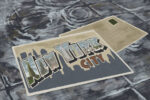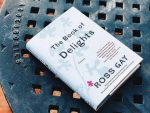In terms of current events, it’s been a long, eventful year: the first year of the Trump presidency, the national explosion of sexual harassment #MeToo stories and ongoing debates about net neutrality, healthcare and global warming, amongst many other topics of note. It’s a lot to keep up with, both in terms of the volume of things happening and the emotional brain capacity needed to take on the information. If you, like me, have been somewhat hesitant to take on all the daily news stories at your disposal over the last year, your intelligent crash-course refresher is in “The Best American Nonrequired Reading 2017.”
The collection is part of the “Best American” series of books published annually by Houghton Mifflin Harcourt, which includes volumes on the best American writing in travel, science fiction, essays, short stories and more. The “Nonrequired” anthology was added to the series in 2002 by author Dave Eggers through his writing nonprofit, 826 Valencia. It is a place for high school students to collect the fiction and nonfiction from the past year that should function as required reading. The collection often highlights pieces that are both extremely timely and often obscure, giving the reader a unique perspective on current events through the eyes of both literature and young people.
While the collection mostly focuses on writing from 2016, as the content is picked over the course of a school-year-long program with the students, the essays are just as timely now and capture the spirit of political and moral debate alive in the country at present. More than any of the other anthologies, the “Best American Nonrequired” series has a “finger on the pulse of the moment,” as Linda Levitt wrote for Pop Matters. Here are four of the best pieces from the collection for insightful reading and context.
1. “My President Was Black” – essay by Ta-Nehisi Coates
The transition of power in the U.S. from former President Barack Obama to current President Donald Trump was obviously the most dominant and controversial current event to take place this year. While there’s so much to discuss concerning Trump, Atlantic reporter Ta-Nehisi Coates takes a moment to pause for reflection on the significance of the Obama presidency instead, and examines what the radical shift between the two leaders’ ideologies, actions and demeanors means for the country.
Coates views the Trump presidency as a direct result of a black presidency, and notes the significance and specialness of Obama’s election as a black man while also shining a harsh light on the consequences of progress. In addition to extensive research and observation, the piece is based off of several sit-down interviews with Obama post-election, offering a rare, up-close look into the former leader’s optimism and hope for the country moving forward. While Coates isn’t nearly as optimistic as the former president, his epic essay offers a complex perspective on this moment in the country’s history.
2. “I Used to Be a Human Being” – essay by Andrew Sullivan
Writer and blogger Andrew Sullivan says that his addiction to the internet was so severe that at one point, his doctor posed this question to him: “Did you really survive HIV to die of the web?” An early adopter of the internet and blogging, Sullivan chronicles his attempt to unplug and find solitude after reaching a personal crossroads where he felt his overabundance of web usage was affecting his emotional health. The piece seamlessly weaves together scientific research with Sullivan’s personal anecdotes on the struggle to wade through the infinite deluge of online information at our fingertips.
While there’s an endless amount of articles about the positive and negative effects of the web floating around on the internet, this one goes deeper, examining what society’s rapidly formed addiction to the internet reveals about our needs for belonging, purpose and gratification. In 2017, it’s clear that our daily interaction with and dependence on the web isn’t going anywhere, but Sullivan’s piece offers the perspective necessary to keep existing in an internet-pervasive state responsibly.
3. “Peace Shall Destroy Many” – essay by Miriam Toews
While an essay on Mennonite culture from a Canadian author may seem to be the furthest topic from the 2017 headlines, the issue essayist Miriam Toews explores has everything to do with our current climate. In “Peace Shall Destroy Many,” Toews examines the detrimental effects of her Mennonite community’s emphasis on non-violence and non-conflict.
While describing the history of the precedent, she gets to the heart of the danger present in a passive society: “Pacifism and non-conflict, core tenets of the Mennonite faith, may in fact be sources of violence and conflict, all the more damaging because unacknowledged or denied.” She deftly describes how this overarching religious belief infiltrated her family’s personal life—many issues or traumas were suppressed, leading, she suggests, to copious amounts of hidden guilt and the suicide of both her sister and her father.
Toews’ argument is gripping in and of itself, but is especially illuminating in light of the #MeToo movement and the recent outpouring of stories of sexual abuse in the workplace it has revealed. For so long, a culture of silence had permeated the topic of sexual harassment and assault in the workplace. It was only when women began to tell their stories, and encourage other women to do the same, that a national conversation started taking place and real change occurred. During a moment when the country seems to be facing conflict and misinformation on a daily basis, Toews’ essay is an important reminder that silence can be just as dangerous as fighting words.
4. Selected tweets from @WernerTwertzog
Finally, a bonus tweet. The great thing about the “Nonrequired Reading” series is that students often pick writing outside the realm of traditional literature, and they’ve really found a gem this year with selected posts from the @WernerTwertzog Twitter account. The account emulates the voice of German director Werner Hertzog, who is known for his “bleak if deadpan” narration in documentaries, by taking on his voice to make daily proclamations that define the idea of dark humor. Take these zingers from March 2016: “Man is born free, but everywhere he is checking work-related email”; “The universe will expand into a cold, thin haze of elementary particles. Nothing you did will matter. #mondaymotivation.”
It is important for American children to die of treatable diseases so that politicians–who love to make a show of their piety, in defiance of scripture–can provide the super-rich with toilets of even purer gold.
— Werner Twertzog (Parody) (@ParodyWerner) December 19, 2017
The account captures the very real anxiety of 2017 in an ironic, self-deprecating way through the most 2017 medium (Twitter). It also captures the voice of so-called millennial humor, which was described by reporter Elizabeth Bruenig in a 2017 Washington Post article as often being “surreal and dark—and completely meaningless.” Current humor tends to trend toward a quirky nihilism, finding laughs in nonsensical memes or bleak outlooks on the future. Considering the unprecedented, nonsensical nature of the political times our country is experiencing, it’s no surprise that #Twertzog has a strong, disillusioned audience.

















